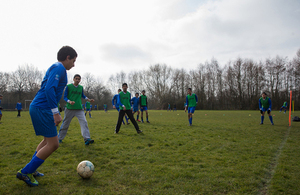Thousands of school children to benefit from life-saving devices
Government strikes deal for 500 affordable defibrillators.

Thousands of pupils will benefit from life-saving defibrillators in their schools, as the government announces it has negotiated a substantial discount on hundreds of the machines.
Schools can now opt to buy defibrillators - easy-to-use machines that could mean the difference between life and death for someone suffering a cardiac arrest - at a reduced price.
The deal, initially for 500 machines, was struck through a reverse auction process run by NHS Supply Chain, in which suppliers ‘bid’ for the lowest price for which they could supply the machines. The government intends to order additional batches of defibrillators, with quantities based on school demand, through further reverse auctions.
The machines, which require no training to be used, work by delivering a controlled electric shock to the heart through sticky pads placed on the chest. The shocks interrupt the irregular heart rhythm that often characterises a cardiac arrest, causing it to return to normal.
Schools Minister David Laws said:
Today’s deal will benefit thousands of pupils and teachers by helping to put hundreds of life-saving defibrillators in classrooms across the country.
Just as we have made schools better places for pupils to learn, it is equally important we ensure children and school staff are cared for in the rare event that they suffer a cardiac arrest.
I encourage all schools to seize upon this excellent deal the government has struck on their behalf.
The announcement - along with a new guide for schools covering the purchase, installation and maintenance of defibrillators - results from collaboration between the Department for Education, the Department of Health and a range of voluntary and community sector organisations.
Simon Gillespie, Chief Executive of the British Heart Foundation, which supports the announcement and is also offering free cardiopulmonary resuscitation (CPR) training kits to all secondary schools as part of its Nation of Lifesavers campaign, said:
More than 30,000 cardiac arrests occur out of hospital in the UK every year, yet just 1 in 10 people survive. Immediate CPR and early defibrillation are crucial steps in saving someone’s life.
By teaching more young people CPR as well as making defibrillators more accessible to schools, we are helping to give every person the absolute best chance of survival.
Sue Killen, Chief Executive of St John Ambulance, said:
Time and again, defibrillators have proven to be the difference between life and death. We are glad to have worked alongside the Department for Education in producing this new guide, and encourage school leaders both to install defibrillators and to equip their school communities with life-saving skills.
Children die every week of sudden cardiac arrest, often due to previously undiagnosed heart conditions. Today’s announcement (26 November 2014), along with the new guide ‘Automated external defibrillators (AEDs) in schools’ being made available to all schools through the GOV.UK website, is intended to help prevent such tragic incidents in schools by giving them access to tools and information.
Defibrillation, together with dialling 999 and performing CPR, can save the life of someone suffering a cardiac arrest. Training is not necessary to use the machines, as the user is given exact instructions on what to do from the moment the device is switched on.
The delivery of an electric shock is fully automated and is only administered if the device has identified a life-threatening heart rhythm which requires and is suitable for a shock.
Schools wishing to purchase a defibrillator through this programme are able to do so by contacting NHS Supply Chain by emailing [email protected] or telephoning 0113 385 4858.
Further details can be found in the guide for schools.
Notes to editors
- Read ‘Automated external defibrillators (AEDs) in schools’, which includes details of how schools can obtain a defibrillator under the arrangements announced today.
- This first batch consists of Philips HeartStart FRx devices, with the make and model of devices likely to vary from batch to batch. The size and timing of future batches will be determined according to school demand, with each batch subject to its own competitive reverse auction process.
- Secondary schools wishing to take advantage of the British Heart Foundation’s free CPR training kits can do so by visiting the BHF website. Each eligible school that applies will receive a pack of 35 kits, each containing a lightweight manikin and a 30-minute training DVD.
DfE media enquiries
Central newsdesk - for journalists 020 7783 8300